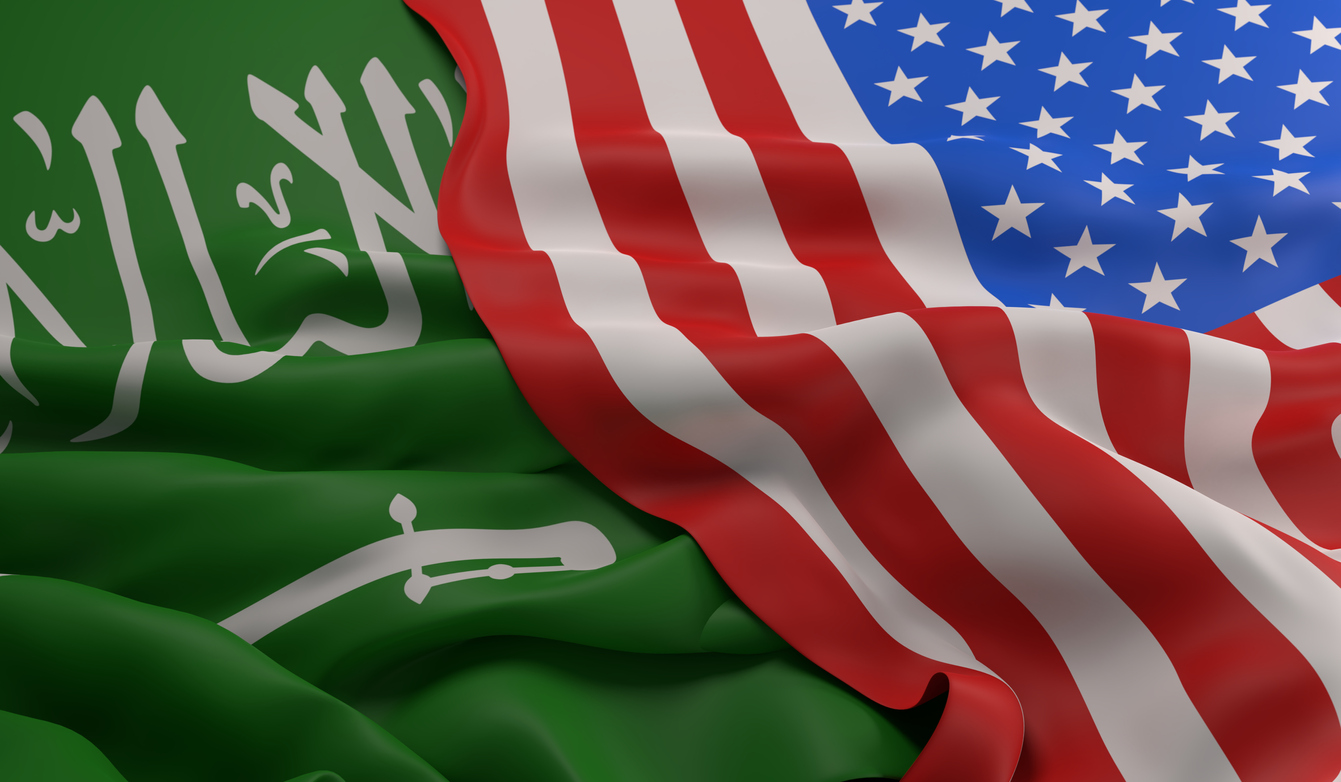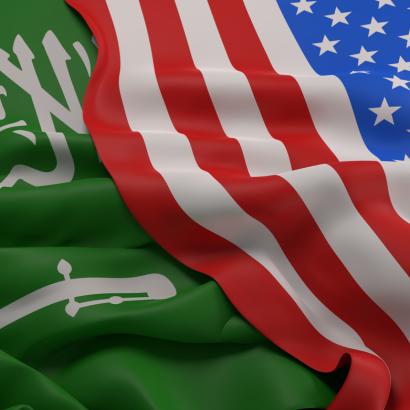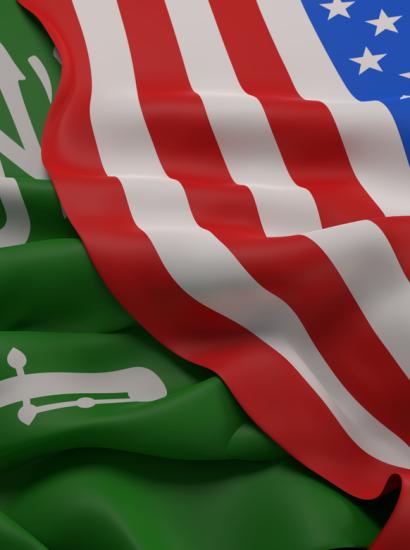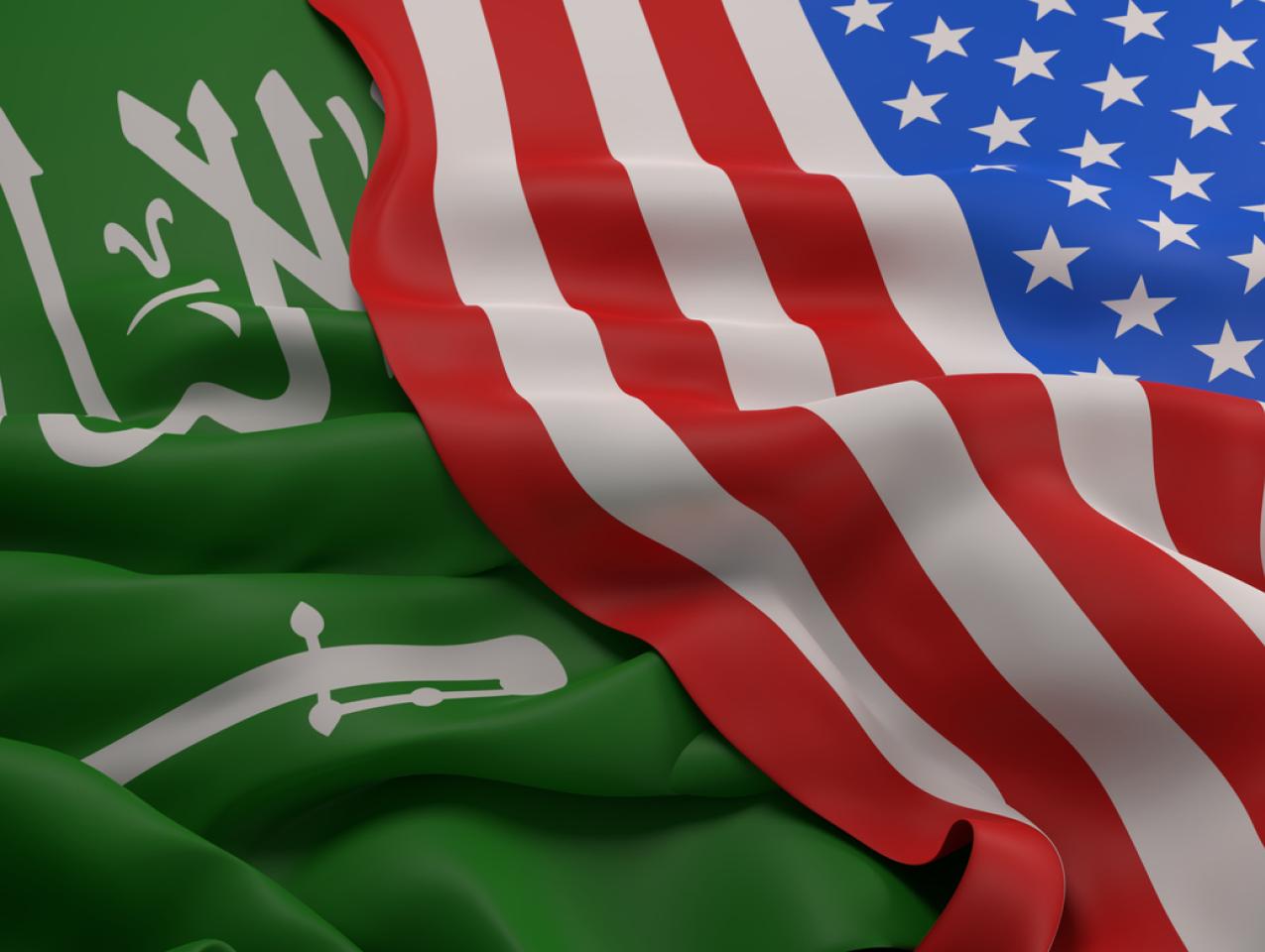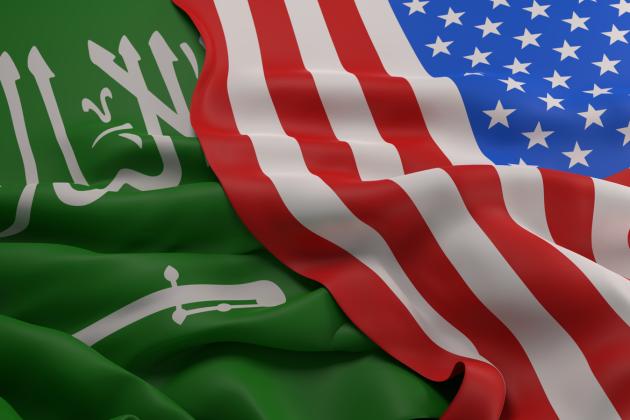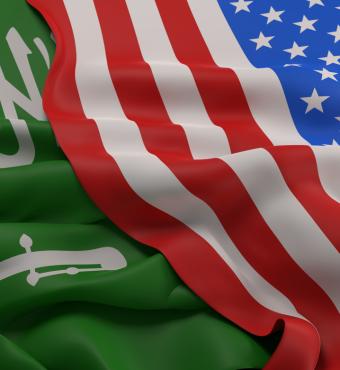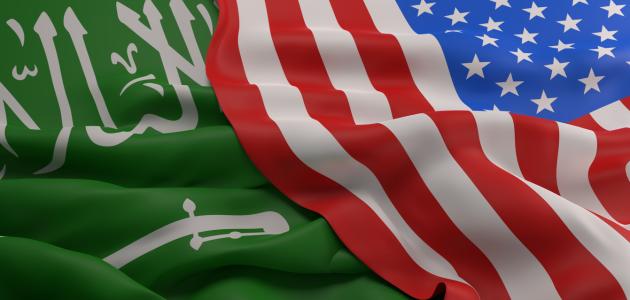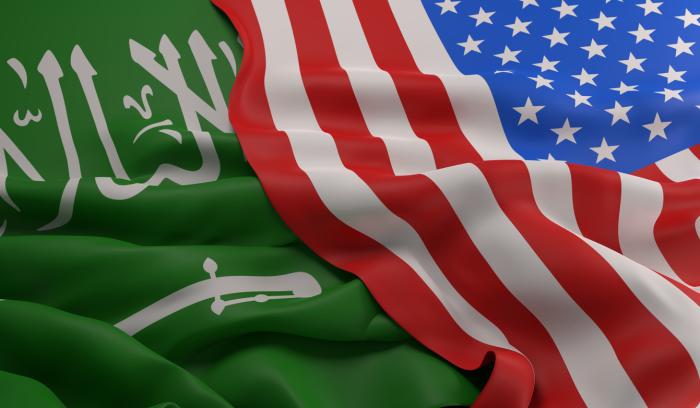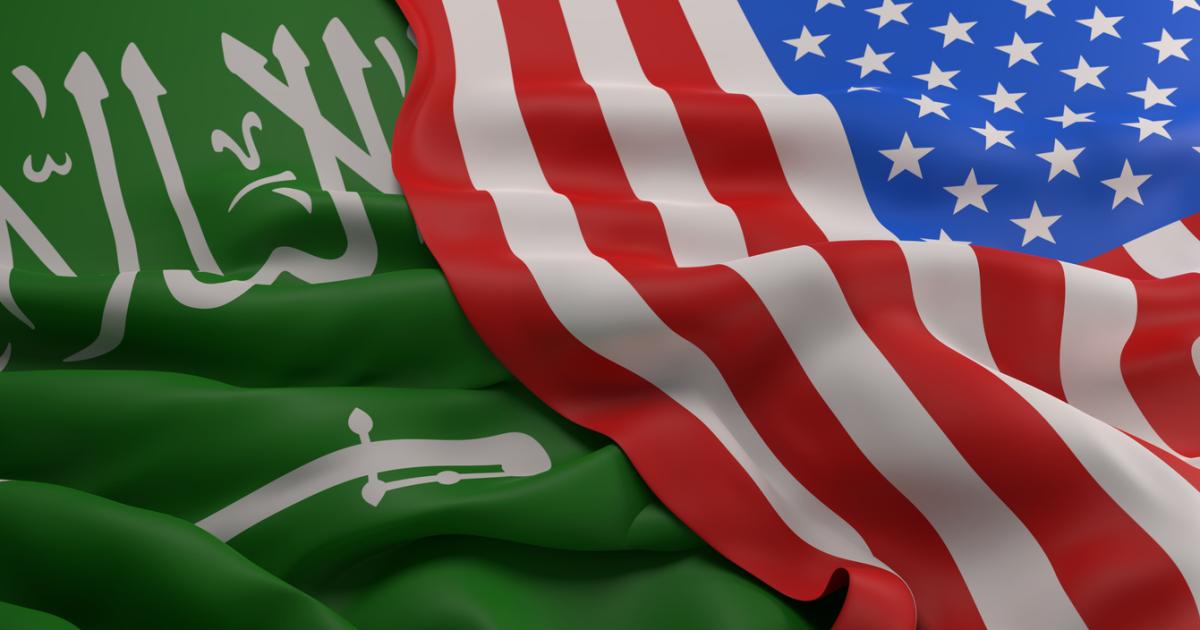- History
- Determining America's Role in the World
Introduction
President Donald Trump has repeatedly expressed his admiration for Saudi Arabia and its crown prince, Mohammed bin Salman (MBS). In a speech in Riyadh in May 2025, Trump lavished praise on his host, calling him “your greatest representative” and adding, “I like him a lot. I like him too much.” These public declarations of affection underscore what has become one of the most unusual and personal relationships in contemporary U.S. foreign policy. The president and the prince appear to share fundamental assumptions about a rightly ordered world. MBS’s vision is basically “Make Saudi Great Again,” and it is therefore easy for Trump to find a common language with him. They both understand and like each other, each knows what makes the other tick and is quite comfortable playing to that.
MBS’s influence on Trump has been evident in several high-profile decisions. At the crown prince’s urging, the president dropped U.S. sanctions on Syria’s new regime led by Ahmad al-Sharaa, a former jihadist, and even met him in Riyadh with warm words of endorsement. Trump also refrained from pressuring Riyadh into joining the Abraham Accords, despite the fact that normalization between Saudi Arabia and Israel is something he personally craves as a potential Nobel Prize–winning achievement.
This essay examines why Trump is so eager to please MBS, whether this bond can evolve into a durable strategic alliance, and how Riyadh itself views the relationship. It also places the Trump–MBS dynamic within the broader context of Saudi Arabia’s regional ambitions, internal transformation, and security concerns.
Trump’s Attraction to Authoritarian Partners
Trump’s critics argue that his affection for MBS reflects a deeper admiration for authoritarian rulers. He often prefers dealing with strongmen who can make swift decisions without being constrained by institutions, parliaments, or independent judiciaries. With such leaders, Trump feels he can achieve quick, visible outcomes.
A more cynical interpretation suggests that Trump sees personal financial advantage in these relationships, particularly with wealthy monarchies sitting atop vast sovereign wealth funds. By cultivating close ties with rulers like MBS, Trump may hope for investments in U.S. ventures that benefit him or his family’s business associates.
Yet Trump has articulated consistent reasons why Saudi Arabia matters for the United States. The Kingdom is:
- A major source of financial investments in the U.S. economy.
- One of the largest purchasers of American weapons systems and technology.
- A key actor in stabilizing and lowering oil prices—something presidents of both parties have sought before elections to keep inflation down.
- A critical player in U.S. competition with China, since Beijing relies heavily on Saudi crude.
The Shadow of the 1970s Oil Crisis
Trump’s worldview was shaped during the oil crises of the 1970s, when Arab states wielded extraordinary influence thanks to skyrocketing prices. He still regards the Saudis as the richest, most powerful actors in global energy politics, even though today’s reality is more complicated.
The Kingdom is burdened by heavy debt as it finances an ambitious economic diversification program under Vision 2030. Its actual ability to deploy vast sums abroad is limited. Still, during Trump’s 2024 visit, Saudi and other Gulf officials pledged trillions in future investments and arms purchases. Even if many of these promises remain unfulfilled, they reinforce Trump’s impression that Gulf rulers are uniquely capable of showering the United States with wealth.
Saudi Arabia’s Vision of Regional Integration
MBS has articulated a sweeping vision of Saudi Arabia as the economic hub of a peaceful, integrated Middle East. Riyadh aims to lead in logistics, transportation, technological investment, energy production, mining, and industrial manufacturing. Israel fits into this picture because of its technological and military prowess, strategic location, and global influence. For Saudi Arabia, normalization with Israel is ultimately necessary for this regional vision. But Riyadh insists that Israel first accommodate Palestinian aspirations by allowing for the creation of a Palestinian state with East Jerusalem as its capital.
The Saudis are not seeking to dictate the exact shape of this state; they defer to Palestinian negotiators on details. In practice, however, this leaves Israel with veto power over Palestine’s borders, security arrangements, and sovereignty. Still, Riyadh believes that resolving the Israeli–Arab conflict is essential to reducing instability and radicalization—preconditions for building prosperity.
At present, Israel shows little inclination to compromise. Traumatized by Hamas’s October 7, 2023 attacks and dominated by a right-wing government, Israeli society has become more rejectionist. Prime Minister Netanyahu is pursuing annexationist policies that effectively rule out a Palestinian state on territories captured in 1967. The decision on whether to embrace normalization with Saudi Arabia rests with Netanyahu or his successor after the next elections.
Riyadh’s View of Israeli Power
While open to normalization, Saudi Arabia does not want a Middle East dominated unilaterally by Israel—especially an Israel that blocks Palestinian statehood or expands into Syria and Lebanon. Instead, Riyadh seeks a regional order of well-defined nation-states allied under U.S. leadership.
In this vision, Israel, Egypt, and the Gulf Cooperation Council (GCC) states would form a bloc to contain the “axis of resistance”: Iran, Hezbollah, the Houthis, Iraqi Shiite militias, and jihadist groups like al-Qaeda or ISIS. The U.S. Central Command (CENTCOM) already provides the defensive umbrella for this architecture. During the recent conflicts, CENTCOM successfully intercepted Iranian, Hezbollah, and Houthi missiles and drones targeting Israel.
Saudi Arabia wants access to the same level of U.S. protection enjoyed by Israel: missile defense systems, carrier strike groups, and, if necessary, a nuclear deterrent. Riyadh’s goal is to be treated as an equal partner in a U.S.-led defense and intelligence network, not as a subordinate. It views hegemonic ambitions—whether from Iran, Turkey, or even Israel—as threats to stability. The Saudis hope that a future Israeli government that is less ideologically rigid will be willing to share in their regional vision.
Informal Ties with Israel
Even without formal normalization, Saudi and Israeli officials have quietly engaged for years. Cooperation is rumored in intelligence sharing and limited defense matters. Before October 7, Saudi Arabia signaled goodwill by allowing Israeli athletes to participate in tournaments held in the Kingdom and granting overflight rights to Israeli airlines. Some Saudis even invested in Israeli startups without censure.
The Gaza war, however, has chilled these tentative openings. Graphic images of Palestinian suffering have galvanized Saudi public opinion, especially among younger citizens. Nearly half the population has contributed to humanitarian relief for Gaza. In response, the Saudi leadership, including MBS, condemned Israel’s actions as genocidal and demanded a ceasefire.
Given this atmosphere, it is hard to imagine Riyadh resuming normalization talks unless the war ends and Israel at least acknowledges a pathway to Palestinian statehood. Without such steps, the political risks of being branded traitorous in the Arab and Muslim world are too high. Yet eventually, the Saudi leadership may argue that normalization serves national interests—once conditions make it politically viable.
Pushing for Recognition of Palestine
To signal its commitment to the Palestinian cause, Saudi Arabia has worked with France to secure broader international recognition of Palestine. Riyadh knows recognition alone will not resolve the conflict, but symbolically it matters—especially if major European states such as France, the UK, and Germany act together. The Saudis have also urged Washington to recognize Palestine, so far without success. With 147 of 193 UN member states already recognizing Palestine, the practical impact is minimal, but the campaign highlights Riyadh’s balancing act: demonstrating solidarity with Palestinians while keeping normalization with Israel as a long-term goal.
Saudi Arabia as a Reluctant Hegemon
Contrary to assumptions that Saudi Arabia seeks regional dominance, MBS has steered the Kingdom inward toward domestic transformation. Ideologically, the state is re-framing national identity away from Wahhabism. The new narrative emphasizes the Al Saud dynasty’s role in unifying the nation, ending tribal warfare, and bringing stability and prosperity. Religious warfare and missionary activity—once central to the official story—are now minimized.
Social reforms have been dramatic: women can drive, guardianship rules have been relaxed, harassment is punished, and entertainment is flourishing. Riyadh and Jeddah today are strikingly more liberal than a decade ago.
Economically, Vision 2030 seeks to reduce dependence on oil by investing massively in logistics, transportation, renewable and nuclear energy, mining, tourism, and real estate. This requires enormous resources, much of which must be spent domestically rather than abroad.
Saudi Arabia’s foreign policy has traditionally been defensive and reactive, aimed at preserving dynastic rule against revolutionary ideologies—from Nasser’s Arab socialism to Khomeini’s Islamic revolution. Even its use of Islamism abroad, often in partnership with the U.S. during the Cold War, was more about self-preservation than imperial ambition. After 9/11, Riyadh slowly distanced itself from Islamist patronage, a process accelerated under MBS, who has cut off funding to Islamist activists and repressed domestic Islamists.
In short, Saudi Arabia’s priority today is internal transformation, not regional domination.
The Iranian Threat
Despite its inward focus, Riyadh cannot escape the looming threat of Iran. Saudi leaders believe another Israeli strike on Iran is inevitable, given Tehran’s support for militias and pursuit of nuclear weapons. If the Iranian regime feels existentially threatened, Riyadh fears retaliatory attacks on critical Saudi infrastructure: desalination plants, power grids, communication systems, and oil facilities. To prepare, Saudi Arabia has developed emergency response plans but ultimately seeks a U.S. security guarantee. It wants a mutual defense treaty, missile defense cooperation, and even consideration of a U.S. nuclear umbrella. MBS is expected to visit Washington soon to finalize defense agreements.
Meanwhile, Riyadh has pursued a cautious détente with Tehran, signing a Chinese-brokered agreement in 2023 to restore diplomatic relations. It has also condemned Israeli attacks on Iran and declared neutrality by refusing to allow its territory to be used in those strikes. But MBS harbors no illusions about the revolutionary nature of Iran’s regime, and until there is leadership change in Tehran, he will continue to rely on U.S. protection.
Rivalry with Turkey and the Syrian Question
Saudi Arabia also views Turkey as a rival power, seeking influence through the Muslim Brotherhood. In Syria, Riyadh has pinned cautious hopes on Ahmed al-Sharaa, a former jihadist who now claims to embrace a more tolerant form of Salafism.
With no other viable leadership on the horizon, Saudi Arabia is willing to test al-Sharaa’s intentions, betting that he can break free from Turkish patronage if given Saudi support. For Riyadh, Syria is strategically vital: stabilizing it would block Iran from establishing a land corridor to the Mediterranean. Helping al-Sharaa succeed in creating a functioning state could therefore serve both Saudi and regional security.
Trump, Biden, and the U.S.–Saudi Relationship
Under President Biden’s last two years, U.S.–Saudi ties had become increasingly institutionalized. Negotiations advanced on a defense treaty linked to normalization with Israel, civilian nuclear cooperation, a free trade agreement, streamlined arms sales, and AI collaboration. These agreements were nearly ready for signature before the October 7 crisis derailed them.
Trump inherited this progress, and some deals may soon be signed. But his style is far more personal and less institutional. He has not appointed an ambassador to Riyadh, preferring to rely on confidants such as Steve Witkoff and his son-in-law Jared Kushner, whose investment firm has received billions in Saudi funds.
Such arrangements worry Saudi leaders. They value the relationship but remain wary of Trump’s volatility. He can turn on allies abruptly, as he did with India’s Narendra Modi. He also continues to view Saudi Arabia through a 1970s lens—as a state with bottomless wealth. This misperception ignores the fiscal constraints imposed by Vision 2030’s immense costs.
Trump’s first presidential visit was to Riyadh, where he expected $1 trillion in Saudi investment. While large promises were made, they are unlikely to materialize because funds are needed domestically. Thus, while Trump embraces an “America First” approach, Saudi Arabia has its own “Saudi First” imperatives and faces practical limits that make it harder to meet his expectations.
By contrast, Biden’s institutionalized approach, though less warm personally, offered more predictability. For Riyadh, the contrast highlights the risks of a relationship that rests too heavily on personal chemistry rather than stable strategic foundations.
Conclusion
The Trump–MBS “bromance” is real, but it is shaped as much by Trump’s worldview and formative experiences as by Saudi Arabia’s promises. Trump admires decisive rulers, expects Gulf wealth to flow into the U.S., and sees Saudi Arabia as a cornerstone of his regional strategy. For MBS, Trump offers access, flattery, and the prospect of U.S. protection at a time when Riyadh faces threats from Iran, Turkey, and regional instability.
Yet beneath the personal rapport lie deep uncertainties. Saudi Arabia’s fiscal limitations, Israel’s rejectionism, Iran’s militancy, and Trump’s volatility all complicate the picture. The Kingdom seeks security guarantees, economic partnerships, and regional stability, not hegemony. The U.S. under Trump may offer warmth, but not always reliability.
The future of U.S.–Saudi relations, then, will hinge on whether this bond can mature beyond personalistic ties into a truly strategic partnership—one capable of weathering not only the ambitions of its leaders but also the fires raging around the Kingdom.
Bernard Haykel is Professor of Near Eastern Studies at Princeton University.







